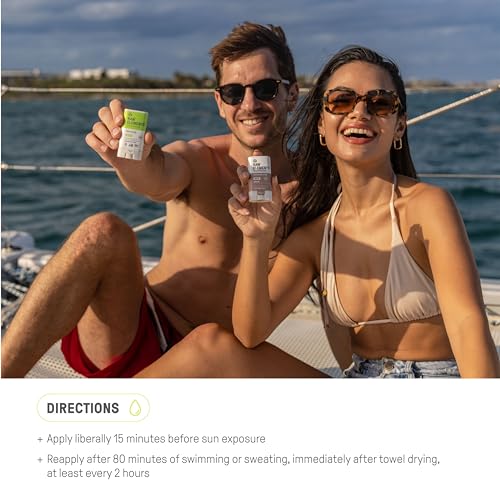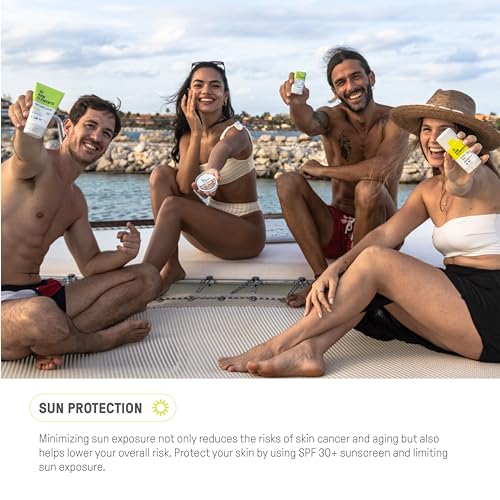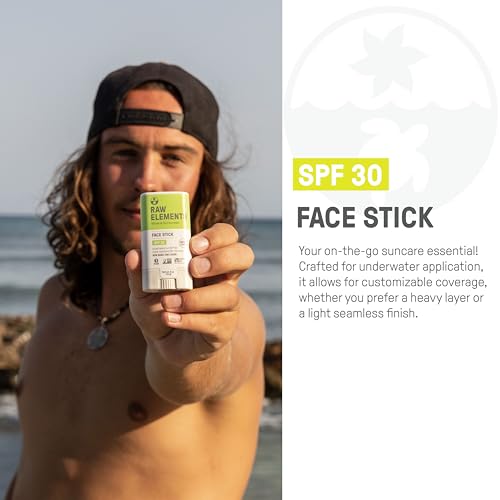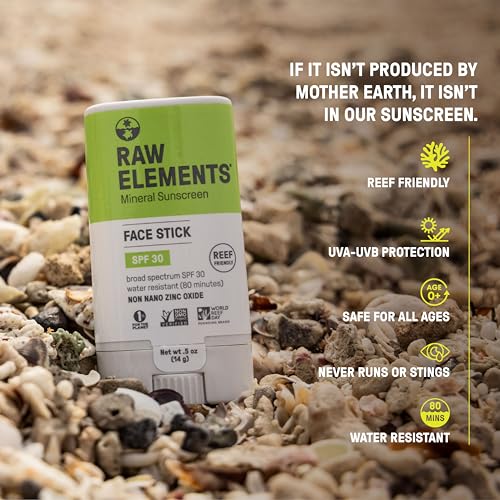







Raw Elements Face Sunscreen Stick - SPF 30+, 95% Organic, Water-Resistant, 0.5 oz


Cannabis Sativa (Hemp) Extract
High RiskCannabis sativa (hemp) extract is derived from the hemp plant, primarily used for its potential therapeutic properties. It contains various cannabinoids, flavonoids, and terpenes, which may contribute to its functional benefits in cosmetic and wellness products. The extract is often sought for its calming and anti-inflammatory effects.
Sustai Insights
Cannabis sativa (hemp) extract offers functional benefits such as anti-inflammatory properties and potential skin-soothing effects. It is derived from sustainably sourced hemp, contributing to its appeal. However, there are health risks associated with its use, including low concerns for carcinogenicity and neurotoxicity. Regulatory restrictions exist in certain jurisdictions, marking it as high risk overall. Safe usage should be practiced, particularly in sensitive applications, and alternatives like hemp seed oil may be considered for specific uses.
Camellia Sinensis (Green Tea) Leaf Extract
Medium RiskCamellia sinensis (green tea) leaf extract is derived from the leaves of the Camellia sinensis plant, primarily known for its antioxidant properties. It is commonly used in cosmetic formulations for its potential to soothe the skin and provide protective benefits against environmental stressors.
Sustai Insights
Camellia sinensis leaf extract offers functional benefits, including antioxidant properties that may protect the skin from damage and enhance product efficacy. While generally regarded as safe, it presents moderate allergenic potential and low concerns for carcinogenic or reproductive toxicity. Environmental risks are minimal; however, the sourcing practices should be evaluated for sustainability. Regulatory bodies do not impose significant restrictions, indicating a low-risk profile overall. Safe usage practices are advisable, and alternatives include other botanical extracts with similar benefits.
Rosmarinus Officinalis (Rosemary) Leaf Oil
Medium RiskRosmarinus officinalis (rosemary) leaf oil is extracted from the leaves of the rosemary plant. It is commonly used in cosmetic and personal care products for its aromatic properties and potential preservative benefits due to its antioxidant content.
Sustai Insights
Rosemary leaf oil offers functional benefits such as antimicrobial and antioxidant properties, which can enhance product stability. It is derived from a renewable source and is biodegradable. However, it presents moderate risks of allergic reactions and skin irritation, particularly with enhanced skin absorption. Regulatory bodies have noted restrictions on its usage in specific concentrations. The overall risk level is assessed as medium. Users are advised to follow safe usage practices and may consider alternatives like tocopherols or other natural preservatives.
Rosmarinus Officinalis (Rosemary) Leaf Extract
Medium RiskRosemary leaf extract is produced from the leaves of the Rosmarinus officinalis plant. It is commonly used in cosmetic formulations for its potential antioxidant properties and fragrance. The extract may also contribute to the preservation of products due to its antimicrobial characteristics.
Sustai Insights
Rosemary leaf extract offers functional benefits such as antioxidant and antimicrobial properties, which can enhance product stability and shelf-life. It is generally considered low risk for carcinogenicity and reproductive toxicity, but it carries a moderate potential for allergic reactions. Environmentally, it poses low risk with no significant pollutant or bioaccumulation concerns. Regulatory bodies have not placed significant restrictions on its use, although some verified products cannot contain certain concentrations. Overall, the ingredient's risk level is medium, necessitating careful usage practices to mitigate allergic responses.
Mangifera Indica (Mango) Seed Butter
Low RiskMangifera indica (mango) seed butter is a fat extracted from the seeds of the mango fruit. It is commonly used in cosmetic formulations for its emollient and moisturizing properties, providing a smooth texture and enhancing product stability.
Sustai Insights
Mango seed butter offers functional benefits such as effective moisturization and skin conditioning, derived from its fatty acid profile. It is considered low risk regarding health concerns, with minimal allergenic potential and no significant environmental hazards. Regulatory agencies have not imposed restrictions on its use. Overall, the ingredient is assessed as low risk, making it a suitable option for various cosmetic products. Alternatives include other plant-based butters like shea or cocoa butter for similar properties.
Theobroma Cacao (Cocoa) Seed Butter
Low RiskTheobroma cacao (cocoa) seed butter is extracted from the roasted seeds of the cocoa plant. It is commonly used in cosmetics and skincare products for its emollient properties, helping to moisturize and soften the skin. Cocoa butter is also known for its stability and resistance to rancidity.
Sustai Insights
Cocoa butter is recognized for its effective moisturizing properties and is sustainably sourced, contributing to its appeal in personal care products. It poses low health risks, with minimal concerns regarding carcinogenicity, allergies, or reproductive toxicity. Environmentally, it does not significantly contribute to pollution or bioaccumulation. Regulatory bodies impose few restrictions, affirming its safety. Overall, the risk associated with cocoa seed butter is low, making it a favorable ingredient in cosmetics. Alternatives include shea butter or plant oils for similar emollient benefits.
Euphorbia Cerifera (Candelilla) Wax
Low RiskCandelilla wax is extracted from Euphorbia cerifera, a shrub native to northern Mexico and the southwestern United States. It is primarily used as a thickening agent, emollient, and film-forming agent in cosmetic and personal care products.
Sustai Insights
Candelilla wax serves effectively as a natural thickener and emollient, contributing to product texture and moisture retention. It is biodegradable and sourced sustainably, supporting eco-friendly formulations. Health risks are low, with minimal concerns about sensitization. Environmental hazards are also low, with no significant pollutant or bioaccumulation potential noted. Regulatory bodies impose few restrictions, indicating overall low risk. Safe usage practices should be followed, and alternatives like carnauba wax may be considered for those seeking different plant-based options.
Beeswax, Yellow
Low RiskBeeswax, yellow, is a natural wax produced by honeybees, primarily composed of esters of fatty acids and long-chain alcohols. It serves as an emulsifier, thickener, and stabilizer in cosmetic formulations, contributing to texture and consistency. It is commonly used in creams, balms, and lip products.
Sustai Insights
Beeswax provides functional benefits such as enhancing product texture and acting as a natural emulsifier, while also being biodegradable and sustainably sourced. Health risks are minimal, with low concerns for carcinogenicity, allergies, or irritations. Environmental impacts are also low, as it does not bioaccumulate. Regulatory status remains favorable with no current restrictions. Overall, the ingredient poses low risk, making it a suitable choice in cosmetic formulations.
Helianthus Annuus (Sunflower) Seed
Low RiskHelianthus annuus (sunflower) seed is derived from the seeds of the sunflower plant and is commonly used in various cosmetic and personal care products. It serves primarily as an emollient and skin conditioning agent, providing moisture and enhancing the texture of formulations.
Sustai Insights
Helianthus annuus (sunflower) seed offers functional benefits, including skin conditioning and moisturizing properties, while being sustainably sourced and biodegradable. Health risks are minimal, with low concerns for carcinogenicity, allergies, and reproductive toxicity. Environmentally, it presents low risks of pollution or bioaccumulation. Regulatory assessments indicate no current restrictions. Overall, it is considered a low-risk ingredient, and safe usage practices should be maintained. Alternative ingredients may include other plant-based oils, but the sunflower seed oil remains a viable option.
Tocopherol, D Alpha
Low RiskTocopherol, specifically d-alpha tocopherol, is a naturally occurring form of Vitamin E. It is commonly used in cosmetic and personal care products primarily for its antioxidant properties, helping to protect formulations from oxidation and extend shelf life.
Sustai Insights
D-alpha tocopherol provides effective antioxidant benefits, contributing to product stability. It is sustainably sourced and generally regarded as safe, with low concerns regarding carcinogenicity, allergies, and reproductive toxicity. However, there are minor concerns about endocrine disruption. Regulatory bodies have not imposed significant restrictions, indicating low overall risk. Recommended usage practices include adhering to established safe concentration thresholds. Alternatives, such as other forms of Vitamin E or plant-based antioxidants, may also be considered.
Coffea Arabica (Arabian Coffee) Extract
Low RiskCoffea arabica (coffee) extract is an extract derived from the seeds of the Coffea arabica plant. It is commonly used in cosmetic and personal care products for its antioxidant properties and ability to enhance the sensory experience of formulations.
Sustai Insights
Coffea arabica extract offers functional benefits such as antioxidant properties and skin conditioning. It is not currently associated with significant health risks, as concerns regarding carcinogenicity, allergies, and reproductive toxicity are low. Environmentally, it poses minimal risk, with no significant pollutant or bioaccumulation concerns. Regulatory bodies have not issued restrictions on its use. Overall, the risk level associated with this ingredient is low, making it a safe choice for formulation. Alternatives may include other plant extracts with similar benefits.
Mangifera Indica (Mango) Seed Butter
Low RiskMangifera indica (mango) seed butter is a fat extracted from the seeds of the mango fruit. It is commonly used in cosmetic formulations for its emollient and moisturizing properties, providing a smooth texture and enhancing product stability.
Sustai Insights
Mango seed butter offers functional benefits such as effective moisturization and skin conditioning, derived from its fatty acid profile. It is considered low risk regarding health concerns, with minimal allergenic potential and no significant environmental hazards. Regulatory agencies have not imposed restrictions on its use. Overall, the ingredient is assessed as low risk, making it a suitable option for various cosmetic products. Alternatives include other plant-based butters like shea or cocoa butter for similar properties.
Camellia Sinensis (Green Tea) Leaf Extract
Medium RiskCamellia sinensis (green tea) leaf extract is derived from the leaves of the Camellia sinensis plant, primarily known for its antioxidant properties. It is commonly used in cosmetic formulations for its potential to soothe the skin and provide protective benefits against environmental stressors.
Sustai Insights
Camellia sinensis leaf extract offers functional benefits, including antioxidant properties that may protect the skin from damage and enhance product efficacy. While generally regarded as safe, it presents moderate allergenic potential and low concerns for carcinogenic or reproductive toxicity. Environmental risks are minimal; however, the sourcing practices should be evaluated for sustainability. Regulatory bodies do not impose significant restrictions, indicating a low-risk profile overall. Safe usage practices are advisable, and alternatives include other botanical extracts with similar benefits.
Theobroma Cacao (Cocoa) Seed Butter
Low RiskTheobroma cacao (cocoa) seed butter is extracted from the roasted seeds of the cocoa plant. It is commonly used in cosmetics and skincare products for its emollient properties, helping to moisturize and soften the skin. Cocoa butter is also known for its stability and resistance to rancidity.
Sustai Insights
Cocoa butter is recognized for its effective moisturizing properties and is sustainably sourced, contributing to its appeal in personal care products. It poses low health risks, with minimal concerns regarding carcinogenicity, allergies, or reproductive toxicity. Environmentally, it does not significantly contribute to pollution or bioaccumulation. Regulatory bodies impose few restrictions, affirming its safety. Overall, the risk associated with cocoa seed butter is low, making it a favorable ingredient in cosmetics. Alternatives include shea butter or plant oils for similar emollient benefits.
Rosmarinus Officinalis (Rosemary) Leaf Oil
Medium RiskRosmarinus officinalis (rosemary) leaf oil is extracted from the leaves of the rosemary plant. It is commonly used in cosmetic and personal care products for its aromatic properties and potential preservative benefits due to its antioxidant content.
Sustai Insights
Rosemary leaf oil offers functional benefits such as antimicrobial and antioxidant properties, which can enhance product stability. It is derived from a renewable source and is biodegradable. However, it presents moderate risks of allergic reactions and skin irritation, particularly with enhanced skin absorption. Regulatory bodies have noted restrictions on its usage in specific concentrations. The overall risk level is assessed as medium. Users are advised to follow safe usage practices and may consider alternatives like tocopherols or other natural preservatives.
Euphorbia Cerifera (Candelilla) Wax
Low RiskCandelilla wax is extracted from Euphorbia cerifera, a shrub native to northern Mexico and the southwestern United States. It is primarily used as a thickening agent, emollient, and film-forming agent in cosmetic and personal care products.
Sustai Insights
Candelilla wax serves effectively as a natural thickener and emollient, contributing to product texture and moisture retention. It is biodegradable and sourced sustainably, supporting eco-friendly formulations. Health risks are low, with minimal concerns about sensitization. Environmental hazards are also low, with no significant pollutant or bioaccumulation potential noted. Regulatory bodies impose few restrictions, indicating overall low risk. Safe usage practices should be followed, and alternatives like carnauba wax may be considered for those seeking different plant-based options.
Beeswax, Yellow
Low RiskBeeswax, yellow, is a natural wax produced by honeybees, primarily composed of esters of fatty acids and long-chain alcohols. It serves as an emulsifier, thickener, and stabilizer in cosmetic formulations, contributing to texture and consistency. It is commonly used in creams, balms, and lip products.
Sustai Insights
Beeswax provides functional benefits such as enhancing product texture and acting as a natural emulsifier, while also being biodegradable and sustainably sourced. Health risks are minimal, with low concerns for carcinogenicity, allergies, or irritations. Environmental impacts are also low, as it does not bioaccumulate. Regulatory status remains favorable with no current restrictions. Overall, the ingredient poses low risk, making it a suitable choice in cosmetic formulations.
Helianthus Annuus (Sunflower) Seed
Low RiskHelianthus annuus (sunflower) seed is derived from the seeds of the sunflower plant and is commonly used in various cosmetic and personal care products. It serves primarily as an emollient and skin conditioning agent, providing moisture and enhancing the texture of formulations.
Sustai Insights
Helianthus annuus (sunflower) seed offers functional benefits, including skin conditioning and moisturizing properties, while being sustainably sourced and biodegradable. Health risks are minimal, with low concerns for carcinogenicity, allergies, and reproductive toxicity. Environmentally, it presents low risks of pollution or bioaccumulation. Regulatory assessments indicate no current restrictions. Overall, it is considered a low-risk ingredient, and safe usage practices should be maintained. Alternative ingredients may include other plant-based oils, but the sunflower seed oil remains a viable option.
Rosmarinus Officinalis (Rosemary) Leaf Extract
Medium RiskRosemary leaf extract is produced from the leaves of the Rosmarinus officinalis plant. It is commonly used in cosmetic formulations for its potential antioxidant properties and fragrance. The extract may also contribute to the preservation of products due to its antimicrobial characteristics.
Sustai Insights
Rosemary leaf extract offers functional benefits such as antioxidant and antimicrobial properties, which can enhance product stability and shelf-life. It is generally considered low risk for carcinogenicity and reproductive toxicity, but it carries a moderate potential for allergic reactions. Environmentally, it poses low risk with no significant pollutant or bioaccumulation concerns. Regulatory bodies have not placed significant restrictions on its use, although some verified products cannot contain certain concentrations. Overall, the ingredient's risk level is medium, necessitating careful usage practices to mitigate allergic responses.
Tocopherol, D Alpha
Low RiskTocopherol, specifically d-alpha tocopherol, is a naturally occurring form of Vitamin E. It is commonly used in cosmetic and personal care products primarily for its antioxidant properties, helping to protect formulations from oxidation and extend shelf life.
Sustai Insights
D-alpha tocopherol provides effective antioxidant benefits, contributing to product stability. It is sustainably sourced and generally regarded as safe, with low concerns regarding carcinogenicity, allergies, and reproductive toxicity. However, there are minor concerns about endocrine disruption. Regulatory bodies have not imposed significant restrictions, indicating low overall risk. Recommended usage practices include adhering to established safe concentration thresholds. Alternatives, such as other forms of Vitamin E or plant-based antioxidants, may also be considered.
Cannabis Sativa (Hemp) Extract
High RiskCannabis sativa (hemp) extract is derived from the hemp plant, primarily used for its potential therapeutic properties. It contains various cannabinoids, flavonoids, and terpenes, which may contribute to its functional benefits in cosmetic and wellness products. The extract is often sought for its calming and anti-inflammatory effects.
Sustai Insights
Cannabis sativa (hemp) extract offers functional benefits such as anti-inflammatory properties and potential skin-soothing effects. It is derived from sustainably sourced hemp, contributing to its appeal. However, there are health risks associated with its use, including low concerns for carcinogenicity and neurotoxicity. Regulatory restrictions exist in certain jurisdictions, marking it as high risk overall. Safe usage should be practiced, particularly in sensitive applications, and alternatives like hemp seed oil may be considered for specific uses.
Coffea Arabica (Arabian Coffee) Extract
Low RiskCoffea arabica (coffee) extract is an extract derived from the seeds of the Coffea arabica plant. It is commonly used in cosmetic and personal care products for its antioxidant properties and ability to enhance the sensory experience of formulations.
Sustai Insights
Coffea arabica extract offers functional benefits such as antioxidant properties and skin conditioning. It is not currently associated with significant health risks, as concerns regarding carcinogenicity, allergies, and reproductive toxicity are low. Environmentally, it poses minimal risk, with no significant pollutant or bioaccumulation concerns. Regulatory bodies have not issued restrictions on its use. Overall, the risk level associated with this ingredient is low, making it a safe choice for formulation. Alternatives may include other plant extracts with similar benefits.
Experience sun protection that cares for your skin and the planet with the Raw Elements Face All-Natural Mineral Sunscreen Stick. This SPF 30+ formula delivers robust defense against harmful UVA and UVB rays while being reef-safe and crafted from 95% organic ingredients. Perfect for eco-conscious adventurers, its compact 0.5 oz size makes it easy to carry wherever you go.
- Comprehensive Protection: ensures your skin stays protected during outdoor activities.
- Eco-Friendly: Formulated without harmful chemicals, this sunscreen is reef-safe, helping to preserve delicate marine ecosystems.
- Travel-Ready: Compact and lightweight, the 0.5 oz stick fits effortlessly into any bag, making it your go-to for sun protection on the move.
- Water Resistant: With water-resistant capabilities lasting over 80 minutes, enjoy peace of mind while swimming or sweating on sunny days.
- Gentle & Comfortable: Designed for all ages and skin types, this non-stinging formula ensures smooth application without irritation.
Subscribe & Save with Sustai
- Best Price Guarantee: Always enjoy the lowest prices on sustainable home essentials.
- No Surprises: We’ll notify you before shipping. No hidden fees, ever.
- You’re in Charge: Change, pause, or cancel your subscription anytime with ease.
- Eco-Friendly Deliveries: Our grouped shipments mean less packaging and lower emissions.
Join us on a sustainable journey. Special offers for a limited time! Prices and promotions may change.
Recommended Products
Experience sun protection that cares for your skin and the planet with the Raw Elements Face All-Natural Mineral Sunscreen Stick. This SPF 30+ formula delivers robust defense against harmful UVA and UVB rays while being reef-safe and crafted from 95% organic ingredients. Perfect for eco-conscious adventurers, its compact 0.5 oz size makes it easy to carry wherever you go.
- Comprehensive Protection: ensures your skin stays protected during outdoor activities.
- Eco-Friendly: Formulated without harmful chemicals, this sunscreen is reef-safe, helping to preserve delicate marine ecosystems.
- Travel-Ready: Compact and lightweight, the 0.5 oz stick fits effortlessly into any bag, making it your go-to for sun protection on the move.
- Water Resistant: With water-resistant capabilities lasting over 80 minutes, enjoy peace of mind while swimming or sweating on sunny days.
- Gentle & Comfortable: Designed for all ages and skin types, this non-stinging formula ensures smooth application without irritation.

You can have at most 2 Sustainable Steals products in your cart
Customer Reviews
Customers’ View
Customers appreciate the effectiveness and eco-friendly formulation of the Raw Elements Sunscreen Stick. Many users highlight its reliable sun protection, particularly for sensitive skin, with one customer noting, 'My child is very fair and burns... Not with this. This stays on.' Additionally, the natural ingredients, including non-nano zinc oxide and organic components like mango butter and green tea, resonate well with health-conscious buyers. Users also find the compact size convenient for travel and easy reapplication, as stated by one reviewer who loves its portability. However, some customers mention challenges with application, indicating that the stick may not glide smoothly on the skin. Overall, customers find this product effective and aligned with their sustainable lifestyle.
AI-generated from the text of customer reviewsThis product is rated 4.3 of 5.0 stars.
It has received 4 reviews.




